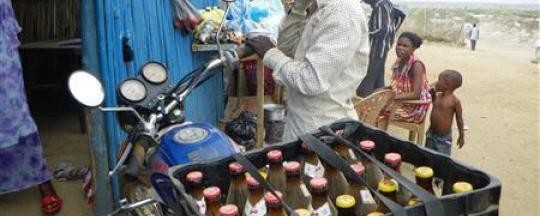Authorities in Kuacjok have given traders up to the end of March to sell out all their beers and alcohol after which they will not be allowed to sell any imported alcohol. The locally made siko brew produced with sugar is also banned, but traditional merisa produced with sorghum is not banned on the grounds that it is less harmful.
Addressing hundreds of Christians during Easter celebrations at Kuacjok Catholic Church on Sunday, Gogrial State Deputy Governor Akot Abiem said he gave traders up to Friday this week as the deadline or face consequences. He also said the government was prohibiting cards, dominos and unorganized night parties.
“Now we have banned alcohol in our state so that we shall be in peace and if you think that we introduce Sharia law then we accept that. Some men and women abandoned their homes and sleep away because of beer and alcohol. We said there is no sale of alcohol here in Kuacjok and the mayor is here and if he will not implement this order then I myself come the 1st of April I will go to the market and implement it,” he said.
The deputy governor revealed that some Ethiopian traders had appealed to him to give them two months in order to sell their beers which they have in store but he refused.
“The deadline is supposed to end some days ago but we added another seven more days until 30th of this month and if we will still get in your store after 7 days then I can tell you we are sorry. I want you to listen to this very well because alcohol is contributing a lot to some of the problems we are having here.”
“After deadline if we find anyone selling beers or alcohol or someone will provide us information that so and so is selling beers or alcohol then we will arrest you and fine you 4000 pounds and 1000 pounds will be given to the person who will provide us with information on those who will still be selling these banned brews illegally.”
However, local women and traders who sell beers and alcohols raised concerns that the ban will affect their livelihood. A mother of four children who sell alcohol in Kuacjok market explained that her family will be suffering if she is stopped from selling alcohol.
“It worries me too much to hear that we will be stop to sell alcohol (locally known as siko). How are we going to survive with my children because the little money I use to get here in the selling of alcohol is what that I can use to buy food for my children and sometimes pay their school fees? I really see this government doesn’t want us here.”
She added, “We will go to Sudan and leave them here with their families as this is what they want.”
Meanwhile, an Ethiopian trader in the town complained that he doesn’t know what to do now as he is selling beers. He stressed that he will close his shop and go back to his country or another state where beer is not banned
“I don’t know what I will do. I imported quantity of beers this month and I have it now in the store. I used all the money I have to buy it and now I will be stopped from selling it. What can I do as this is the only business am relying on. Maybe I can go back to my country. Beer is not ban in Juba or in any other states, so why here in Kuacjok?”
He urged the state government for finding other ways of dealing with crime rather than banning alcohol.




